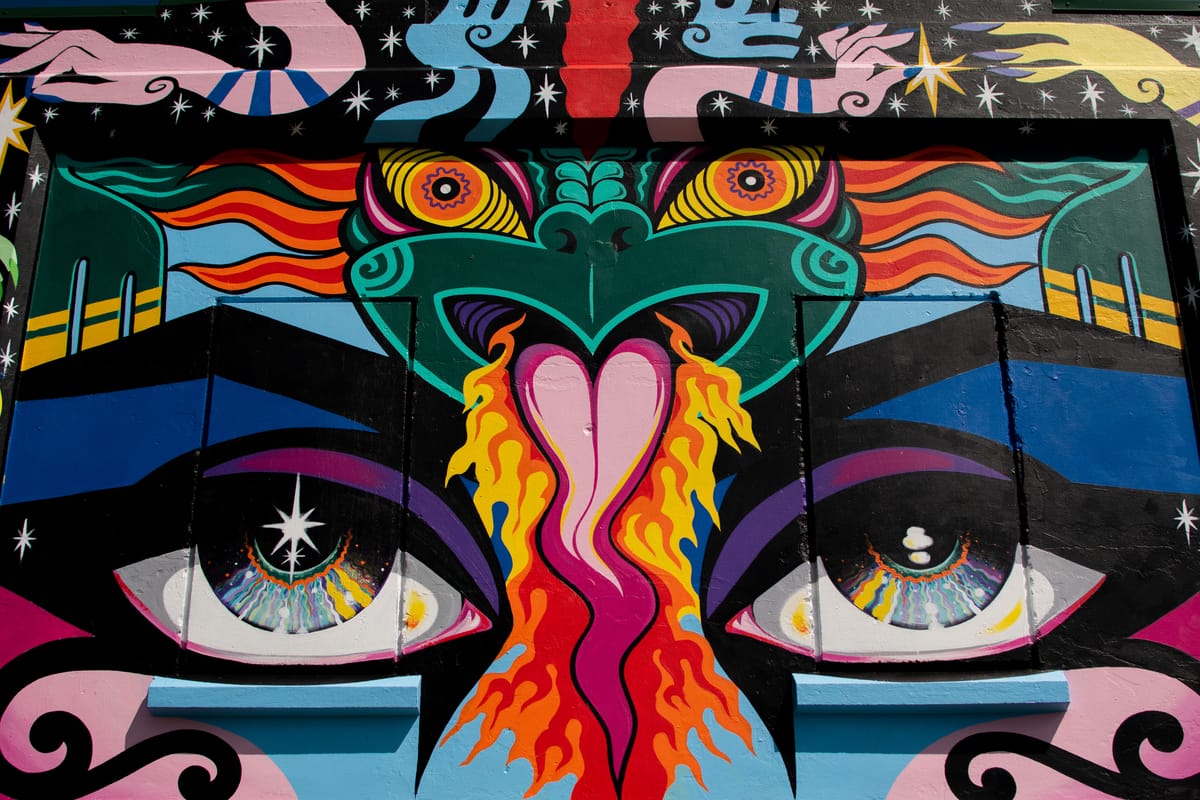2025 Te Whanganui-a-Tara Māori Candidates Issues Index
Learn what our candidates for Wellington's Māori Ward think about climate change issues.

Wellington City Council runs local streets, public spaces, parking, the pipes (for now), public toilets, approving housing, running events, and planning the city’s growth.
The City Council doesn't run the public transport, but they do design the bus lanes and streets our transport depends on.
Your Councillors represents your local suburbs and vote alongside other councillors on big issues.
Wellington City Council can make a big impact on pollution by approving more apartments and changing our streets to be designed first for walking, buses, and bikes.
Read my climate voting guide to understand this index.
The candidates (1 seat to fill)
I have published exactly what candidates sent me. Candidates are ordered alphabetically. Some candidates sent broad responses – when that happened, I asked that they specifically answer individual questions. I have not edited any responses for spelling, length, or grammar.
Te Paea Paringatai – No Affiliation
Are you committed to the Council’s decarbonisation goals: Te Atakura – First to Zero?
Delivering on Te Atakura should be business-as-usual for a future-focused, climate-ready city. It is already embedded in planning frameworks and aligns naturally with Tūpiki Ora, which takes a systems view of wellbeing and resilience. The work ahead isn’t new. It’s about consistency, collaboration, and ensuring delivery mechanisms reflect the integrated strategies that have already been committed to.
What’s the single biggest action you’d take to halve the city’s emissions in the next five years?
The shift to low-emissions transport is already underway, and we need to maintain pace. We’re not starting from scratch: projects like Paneke Pōneke and Let’s Get Wellington Moving already support this direction. Prioritising active and public transport, alongside compact urban development, is core to emissions reduction and urban wellbeing. These are standard features of global cities like Amsterdam and Copenhagen and expected infrastructure for a climate adaptive capital city.
Will you advocate for aligning the Council’s spending to reflect the city’s decarbonisation goals?
Budget alignment is a core part of implementation, it’s not optional. Wellington has the tools to track emissions impact alongside financial performance. Tūpiki Ora reminds us that every dollar spent is a lever for collective wellbeing, either advancing it or undermining it. This isn’t a pivot; it’s a continuation of good governance and joined-up thinking.
Will you support the full rollout of the Paneke Pōneke bike plan within 10 years as originally envisaged?
The plan is already adopted, grounded in evidence, and reflects good practice from cities worldwide. The focus now is on completing delivery, ensuring the design works for all users, and aligning it with broader place-based planning. As part of Tūpiki Ora, we also have a responsibility to ensure mobility infrastructure supports all communities, especially those historically underserved, by improving access, connecting to places of cultural and community significance like marae, and enabling intergenerational wellbeing. This isn’t just climate infrastructure - it’s relational infrastructure that connects people to place and purpose.
Do you support a congestion charge being introduced?
When implemented as part of a complete mobility system. Congestion pricing is a practical tool used globally to manage demand and reinvest in cleaner, more equitable transport. Its role in emissions reduction is well established. The key is delivering it within a system that’s already improving public and active transport access. This is about smart urban management and doing better. It’s also consistent with the Tūpiki Ora kaitiakitanga principle, careful stewardship of our shared resources and working in harmony with te Taiao.
Do you support the 2024 District Plan and the National Policy Statement on Urban Development?
These frameworks provide clarity for how Wellington might grow in a way that is resilient, efficient, and equitable. Intensification in the right places, near transport, services, and green infrastructure, is fundamental. What’s essential now is delivery that reflects Tūpiki Ora: protecting wāhi tapu, enabling papakāinga and housing aspirations, and advancing cultural landscape planning into the mainstream. This isn’t new policy, it reflects our shared responsibility and our collective commitment to future generations.
What climate action would you champion that isn’t already being worked on by the Council?
Rather than adding new initiatives, I would focus on embedding nature-based, mātauranga Māori-led solutions into existing delivery. For example, expanding urban ngahere, māra, and wetlands as part of infrastructure design, not as add-ons, but as essential assets for flood management, carbon sequestration, and community/neighbourly connection. Other cities, like Singapore and Madrid, already treat green infrastructure as baseline. In Pōneke, this aligns naturally with Tūpiki Ora and supports integrated delivery across climate, housing, water, and wellbeing.
Matthew Reweti – Labour
Are you committed to the Council’s decarbonisation goals: Te Atakura – First to Zero?
Yes, I support Te Atakura. The climate crisis demands urgent action and should be at the centre of all our council decisions. Our local Labour team has a policy that all major council decision papers will be required to include a Community Impact Statement, which will include a clear account of the climate impact of each decision.
What’s the single biggest action you’d take to halve the city’s emissions in the next five years?
Transport is the area where local councils can have the biggest impact. A climate-friendly city that works for everyone means making buses, trains, walking, and cycling easy options.
I’m committed to cheaper, faster and more reliable public transport. This includes:
- A second city centre bus corridor along Harbour Quays,
- Improving trip times to and from Karori into the CBD,
- Working across regional and city councils, and with central government, to implement low cost improvements to improve public transport travel times.
I support the Golden Mile changes in principle, which will increase bus priority, though first ensuring it can be delivered within budget and that disruption to business caused by roadworks is minimised.
Transport cannot be separated from housing, and the comprehensive housing policy the local Labour team has released focuses on building more homes, with greater density, in the inner city and close to public transport networks.
Will you advocate for aligning the Council’s spending to reflect the city’s decarbonisation goals?
I support Te Atakura – First to Zero and the local Labour team has a policy that all major council decision papers will be required to include a Community Impact Statement, which will include a clear account of the climate impact of each decision.
Will you support the full rollout of the Paneke Pōneke bike plan within 10 years as originally envisaged?
Our transport policy is about giving people options to get around the city, and that includes making sure people who choose to cycle can do so safely.
I support rolling out the cycle network with an aim to have it completed within 10 years. I am also aware that the council faces a serious financial crunch, particularly given the recent $83million sludge plant blowout, which the next council will have to account for against current projects. This may require some rephasing of existing projects, as has already happened during this term of council when it voted to rephase the rollout as a result of government cuts to the national land transport policy.
Do you support a congestion charge being introduced?
Yes in principle, as it can encourage public transport use and also reduce pressure on the transport network at peak times. I’m also very aware that council needs revenue tools other than rates.
However, I do believe we need to have sufficiently reliable and affordable public transport before it is introduced in Wellington, and I have concerns about the impact on low-income households. There would also have to be exemptions. Trades professionals and other service providers would need to be able to meet their client requirements without additional cost to both.
I'd want to address these issues with our regional council and central government before we introduced a congestion charge in Wellington.
Do you support the 2024 District Plan and the National Policy Statement on Urban Development?
Yes, I do. Labour councillors were one of the drivers of the ambitious new District Plan enabling more homes to be built, led the conversion of empty offices into affordable rentals, protected our public housing stock, and kickstarted the review of rates policy to incentivise development of vacant land.
However, more needs to be done. Wellington City Council must embrace density and take an active role in shaping a city that is modern, liveable, and enables people to live in communities where they work and play, while protecting our most vulnerable. Our housing policy includes:
- Changing consenting practice to be more proactive and supportive of development.
- Incentivising more office to residential conversions.
- Setting up an urban development office (UDO) within WCC to support developers to coordinate residential development alongside transport upgrades.
- Protecting Wellington’s social housing and continuing the HUP2 upgrades
What climate action would you champion that isn’t already being worked on by the Council?
In addition to the policies listed above:
- Investigate a Council ‘green jobs’ programme for projects like home insulation, solar installs, native planting, and water restoration in partnership with central government, unions, iwi, local training institutions, and industry bodies, keeping jobs in-house where possible.
- Work collaboratively with local and regional authorities to develop a regional climate plan with clear emission targets and annual reporting to the public.
- Back the development of meaningful resilience and adaptation plans for Wellington’s most vulnerable communities, including to address flooding and sea level rise.
- Plant more trees in reserves to create habitat for native birds and plant more street trees to provide shade to pedestrians (particularly in under-served suburbs).
- Develop a 100-year vision of environmental restoration for te taiao in partnership with the community, including with iwi, hapū, and other Māori communities.
Tory Whanau – Green Party
Are you committed to the Council’s decarbonisation goals: Te Atakura – First to Zero?
Yes
What’s the single biggest action you’d take to halve the city’s emissions in the next five years?
As Mayor, I've prioritised the reduction of transport emissions by supporting a full cycleway network and will support it to completion.
Will you advocate for aligning the Council’s spending to reflect the city’s decarbonisation goals?
Yes
Will you support the full rollout of the Paneke Pōneke bike plan within 10 years as originally envisaged?
Yes
Do you support a congestion charge being introduced?
Yes
Do you support the 2024 District Plan and the National Policy Statement on Urban Development?
Yes
What climate action would you champion that isn’t already being worked on by the Council?
Higher investment fund in green technology and start ups.
I spend a lot of my spare time creating free, accessible climate advocacy for Wellingtonians. If you can send $2 a month my way, it would help heaps with my website bills. Thank you ❤️
